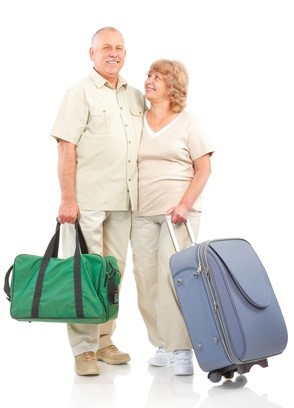
Travel for the Person with Dementia
Why is travel challenging for someone with Alzheimer’s disease?
- Routine is essential for a person with dementia. The disease can make change feel overwhelming and confusing. Change can lead to a great deal of stress for the person with dementia and the caregiver.
- It is easy for the person with dementia to become lost or confused in a new environment.
- Dementia compromises complex thinking and the ability to navigate instructions and transactions.
- It can be hard for a person with dementia to verbalize (and handle) discomfort, such as feeling hungry, thirsty or tired. Discomfort may exacerbate confusion or cause unusual behaviors. And, travel can be pretty tiring!
Tips for Dementia-Safe Travel:
- Always have someone travel with the person with dementia. This is wise even in the early stages of the disease. Travel requires complex thinking and changes often happen at the last minute. Traveling alone is filled with many potential pitfalls for the person with Alzheimer’s.
- Do an assessment beforehand of the person’s current status and the travel plans. Is the person having some current health difficulties or increased confusion/behavior problems? Now might not be the right time to travel. Does the length of the trip (and other logistics) make sense for how the person is functioning?
- Modify plans accordingly. Consider shorter trips or more convenient methods of travel.
- Know before you go. Do some homework so you know where help can be accessed on the trip (where are the local hospitals, pharmacies, etc.?) and think through possible logistical challenges or problems that could arise.
- Pack wisely. Bring along comfort items and plenty of food and drink (check regulations). Bring/pack layered clothing, to adjust for temperature. Bring medications in your carry-on luggage and also bring a list of medications and vital contact information (emergency contacts, details about where you are going, doctor and pharmacy information). Pack some calming items/distractions (a device loaded with music or movies, for example).
- Try to keep as much of a routine as possible. Plan travel times carefully, to minimize sleep and meal disturbances. Try to keep as many elements of your routine in place during the trip as possible. Consider the possible detrimental effects of time changes and jet lag.
- Remember that crowds and big celebrations can be overwhelming for the person with dementia (and the caregiver!). A big family reunion or trip to a theme park really may not be the celebration you envision. Just imagine how confusing and scary these situations could be for someone with dementia (the familiar often seems unfamiliar, remembering people may be impossible and the pressure to perform socially can feel very isolating).
Alternatives for Alzheimer’s Caregivers to Consider:
Though we like to empower elders to continue favorite activities, there may be times when travel is not advisable (at least in the planned format). As we mentioned, assessing the situation and plans first is vital. One option may be to modify the travel plans or do a shorter trip. A second option could be to travel to the elder for a visit.
With today’s technology, you can also “virtually visit” a loved one, using Skype or Facetime for example. You can also think of ways to bring a loved one’s favorite activities or “bucket list” items to them (or make them more convenient). For example, it may not be feasible to make a big trip back to New York for a Yankees game, but maybe you could arrange to take your loved one to a Yankees minor league or spring training game in Tampa.
A lot of creative activities can be done from the comfort of home, too. Type “activities” in to our blog search bar (top right corner of the blog) and you can read a bunch of creative ideas for fun senior-friendly activities that can be done in-home or nearby in Tampa Bay.
If you want help from the senior travel and eldercare pros, contact us anytime at 727-447-5845. We arrange all types of senior travel and activities, as well as offering travel companions (professionally trained in eldercare and dementia care) and caregiver respite. We’re here to help!

